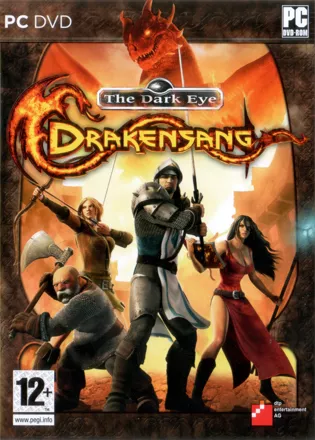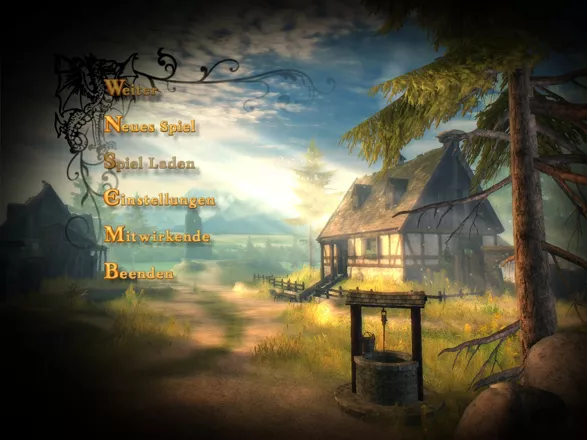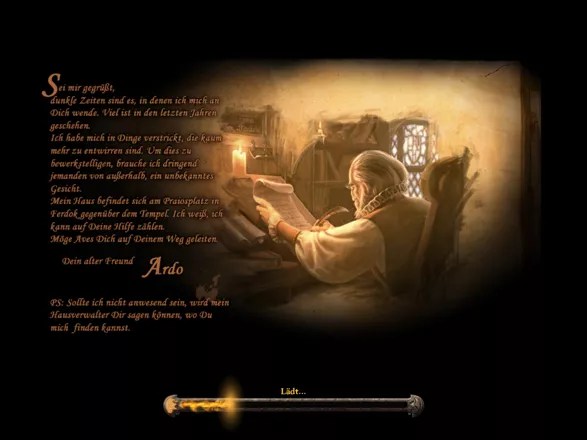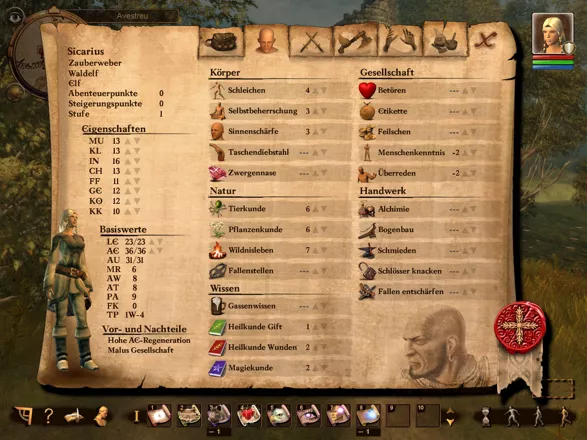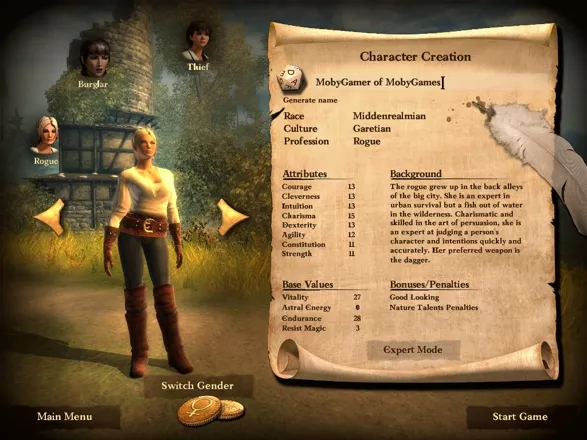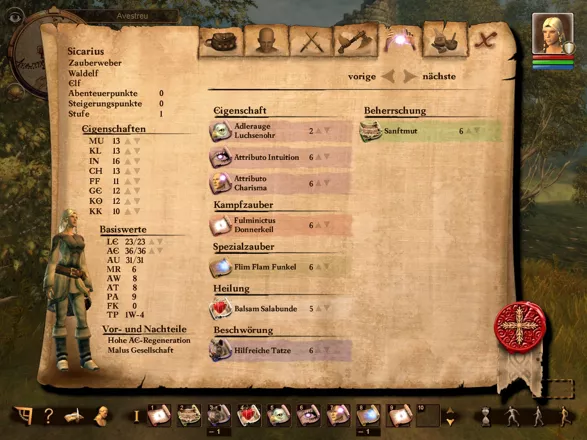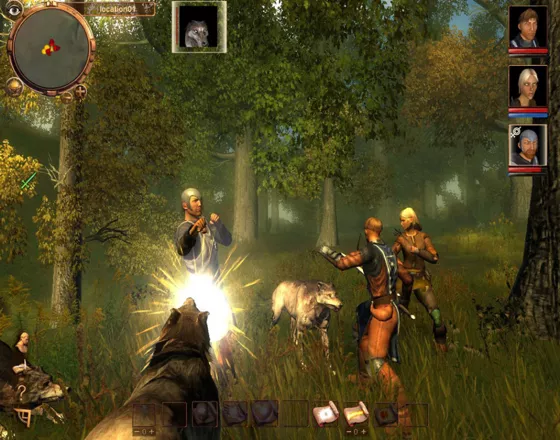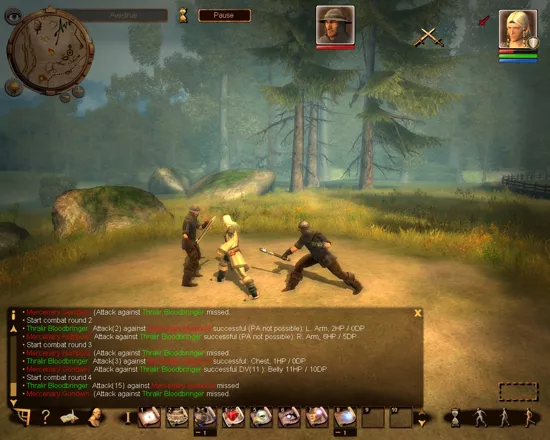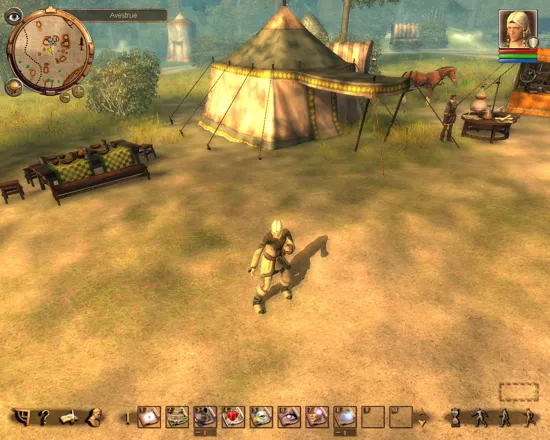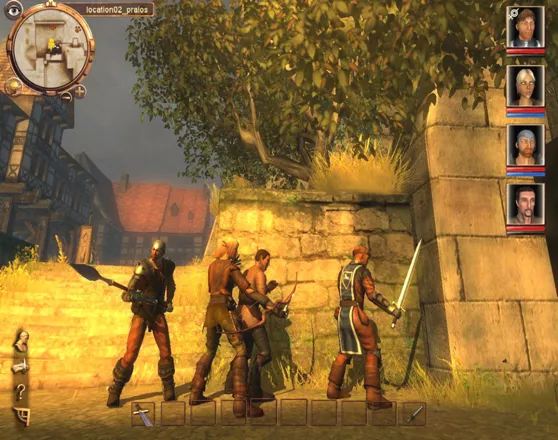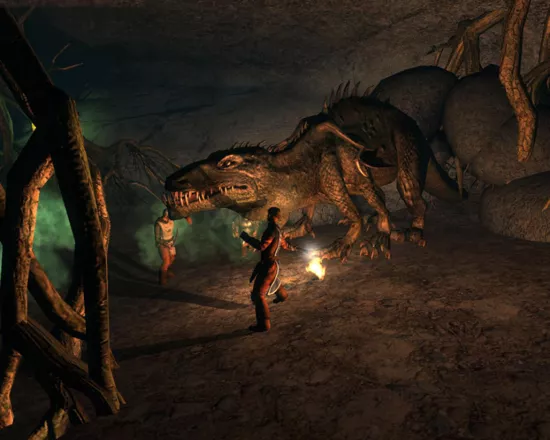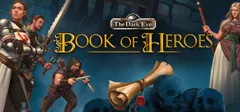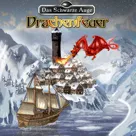The Dark Eye: Drakensang
Description official descriptions
A long time ago, the Gods appointed the Elder Dragons to be the Guardians of the World. But secret forces, hiding in the shadows, sprinkled envy and greed amongst the dragons and a civil war unleashed during which the Elven and Dwarven suffered the most. But in the end, the Elder Dragons successfully restored order and peace entered the land. After the last battle, the Elven left their burning cities and moved to the forest to leave the fight for power once and for all behind. The Dwarven on the other hand could never forgive the dragons for their betrayal. In their veins runs the lust for vengeance and they hate the dragons more than anything else. This was also the time, during which a third race entered the world. Out of the ashes of long forgotten empires, the Humans claimed the lands and, thanks to the intervention of the Elder Dragons, they flourished and began to worship the Elder Dragons as the Keepers of Balance.
But the Keepers are long gone and the races don't even suspect that again dark forces foment betrayal and conflict. Not everything is lost though. There is a sword, forged by the last person to remember the tales in the hottest fires of Aventurien. Named Drakensang, deep inside a mountain it awaits the one true warrior. The one who will find and use it to complete the Dragonquest. The one that will prevent the next great war.
And the one is the hero the player creates at the beginning of the game. He can either chose from seven pre-defined characters like a Elven Mage or a Human Warrior or enter the advanced mode and define every single skill and talent himself just like he would if he played the German Pen & Paper RPG "Das Schwarze Auge". Besides the eight basic attributes like courage or dexterity, there are dozens of other talents in which the player can invest his valuable points for example herbalism or aimed shot.
Every action in the game depends on these values and even if you are talking to someone, dice are being rolled in the background. These samples, as they are called, determine if the hero successfully influences his partner and gets e.g. additional choices in the many multiple choice dialogues. But for these samples not only the points in the relevant talent are a factor but also the skills that this talent uses and to make it even more complex there is sometimes the possibility that a dice roll has a handicap perhaps because the hero is injured or something like this. If the player wishes, he can see all these numbers in a chat-like window on the screen.
But besides the very extensive and complex rule-set, the game is a very classic RPG in which the player travels through a small part of Aventurien, talks to all kinds of peoples, fulfills main- and sidequests, gathers resources to make potions or forge items, kills enemies and overall just gains enough experience for the next level which defines how high he can raise a talent and advance along the story. On his way he will meet several other heroes which are more or less willing to join in on his quest and help in the many battles that await them. These battles are basically fought in realtime, but even a single wolf requires some tactics so the player can pause the game at any time to give every adventurer specific orders on what to do next.
Spellings
- 巨龍之歌 - Traditional Chinese spelling
Groups +
- 3D Engine: The Nebula Device
- Covermount: Level (Romania)
- Drakensang series
- Fantasy creatures: Dragons
- Fantasy creatures: Dwarves
- Fantasy creatures: Elves
- Fantasy creatures: Goblins
- Fantasy creatures: Orcs
- Gameplay feature: Alchemy
- Gameplay feature: Blacksmithing
- Gameplay feature: Burden / Encumbrance
- Gameplay feature: Character development - Training
- Gameplay feature: Equipment quick slots
- Gameplay feature: Hunting
- Gameplay feature: Paper doll inventory
- Green Pepper releases
- Protagonist: Female (option)
- Software Pyramide releases
- The Dark Eye / Das Schwarze Auge universe
Screenshots
Promos
Credits (Windows version)
350 People (303 developers, 47 thanks) · View all
| Director | |
| Lead Game Designer | |
| Lead Level Designer | |
| Lead Programmer | |
| Lead Technology Programmer |
|
| Art Director Environment Design | |
| Art Director Character Design | |
| Assistant Project Management | |
| Level Design | |
| Ingame Cinematics | |
| Additional Level Design | |
| Dialog Authors | |
| [ full credits ] | |
Reviews
Critics
Average score: 77% (based on 62 ratings)
Players
Average score: 4.0 out of 5 (based on 31 ratings with 4 reviews)
Another restrictive RPG that fails to take off
The Good
As far as 'closed-world' or 'hands-off' fantasy roleplaying games are concerned, the 2000's undeniably belonged to the Neverwinter Nights series. Stretching between 2002 and 2008, this string of games, including the main titles and their expansion packs, boasted the production values, writing talent, promotional machinery and eventually the sales figures its competitors could only dream of. Radon Labs were one of these latter day competitors. Their bold endeavor was to revive the 'Das Schwarze Auge' franchise on the PC a decade after the cult favorite Realms of Arkania Trilogy, all in the midst of Bioware's and Obsidian's ongoing triumph with the more accepted D&D setting.
The end product, Drakensang: The Dark Eye, is clearly a match for these twin giants in terms of sheer size, storytelling and complexity, but ultimately falls under in so many ways I almost don't care to count. Actually, I do, hence this review was born. I think it's more interesting to see the ways the game failed rather than the ways it did work, so I'll just breeze through the "good" section.
What have we here:
Lively dialogs; these should be a given in any roleplaying games, but sadly they're not, so when we come across good, colorful writing, we're pleasantly surprised.
An epic scope; again, let's not take this granted anymore, and when a game like this gives it us in spades, we can appreciate it.
A good, effective engine; the best thing about Drakensang is its fluid graphics/audio engine; it's more responsive, less bug-ridden and easier on the eye than NWN2's overworked Aurora engine.
A good economic and crafting system; it's clear that much thought and effort went into this department. This system is so efficient and streamlined, it would deserve a better game.
The Bad
Clichéd writing. While dialogs themselves are good, the overall story suffers from your old sub-Tolkienesque pitting together of dwarves, elves, dragons and humans in a standard fantasy world. That may be a systemic problem with the Das Schwarze Auge setting though.
Clichéd characters. This game is a strange beast: the main characters themselves are often trite, but they get good dialogs. I suspect that dialog writing was outsourced to folks who were more gifted and/or creative than the design department. In any case, we have the stereotypical drunken dwarven fighter; the typically untamed, taciturn amazon warrior; the insipid, altruistic paladin; the evil sorceress who conceals her true identity; and so on. No pleasant surprises in this department.
A curious scarcity of atmosphere despite good graphics. This appears to be a conundrum until we start to think about its reasons, see my further points. The towns don't really feel alive the way they do in, say, Dragon Age: Origins. A major part of this might be due to the fact that none of the houses are accessible, they're just facades in a restrictive game world. Also, the underground dwarven empire, where a huge chunk of the story takes place, should feel gritty and crowded but feels clinical and hollow instead.
Closed world. The game seems to entice us with magnificent vistas and huge open spaces around towns. At first it almost fooled me into thinking I have another Gothic-type free-roamer on my hands. But no: it really features strictly enclosed territories, and even relatively narrow paths of allowed movement, but the skilfully (or rather deviously?) programmed engine does create an illusion of much wider spaces. Yawn.
Hands off. A close relative of the lamentable 'closed world' feature, a hands-off RPG implements a design choice that renders most fixtures and equipments seen in the game environment -- including everyday items that common sense would suggest to be operable and useful in a game like this -- inoperable and useless scenery pieces. "Hands off!", the game seems to yell at us every 3 seconds when we attempt to fiddle with fixtures, stoves, ovens, chairs, anything, just trying to make sense of the graphically detailed environment. No can do. Yaaaaaaaaawwwwn.
Slow movement of the characters. It's plain annoying and extends hours of gameplay in a wrong way. This was discussed in more depth by others.
Constant micromanagement in combat. This was handled better, in a more user-friendly way even in the original Neverwinter Nights. Then it was perfected in NWN2 and DAO. In Drakensang, all you can choose is between Passive and Aggressive battle modes, and both modes require constant on-the-fly tweaking during each long fight, as without assistance all 4 of your characters would act like mindless drones. A familiar problem with 1990's roleplaying games, but it's sad to see it re-emerge in Radon Labs' 2008 debut RPG, even if it was obviously a deliberate design choice based on a misguided "back to the roots" directive.
Respawning enemies. This is so 1980's, it's almost a dealbreaker. At the very least it breaks immersion. Surely there can be more interesting ways to have the player farm XP's. To me, respawning enemies in a roleplaying game indicate that the designers went bankrupt in the creative department.
The Bottom Line
Arguably, the only good way to do a closed-world, hands-off RPG (if you absolutely have to do one) is demonstrated in Neverwinter Nights 2 and Dragon Age: Origins. Designers are supposed to make up for the lack of an open, breathing, explorable world with the inclusion of super-lively, unique characters who fall in love, scheme, argue and banter with each other, a convoluted plot with jaw-dropping twists fit for a top shelf fantasy novel, and a palpable, attention-grabbing atmosphere both in towns and dungeons that will suck you in.
Drakensang provides none of these. And it's a crying shame because its engine and audiovisuals are a notch above NWN2's, the game it apparently attempts to outdo.
Still, there was something in the overall experience -- maybe its sheer epic size, maybe its often entertaining dialogs, most probably both -- that does prompt me to try its prequel, released two years later. But that will be quite some time later, when I'm finished with most of the open-world roleplaying games I'm still behind with.
Windows · by András Gregorik (59) · 2013
The Good
Review Version: v1.1 - Oops, forgot a paragraph.
Review Date: June 23, 2009
Review Length: 7 page(s).
Game Version:v3.2.12.1.
Tech Specs Used: Intel Core 2 6300 1.86 Ghz CPU, 3 GB Memory, 512 MB NVIDIA GeForce 8500 GT Video Card.
Finished:. Yes, May 2009.
Last time played: May, 2009.
Character Class Used: Nature Mage.
Preferred Team Members: Rhulana (Female Human Amazon), Forgrimm (Male Mercenary Anvil Dwarf), Gladys (Female Human Charlatan).
Last Character Level Reached: Level 18.
Introduction: Soul
Note: This section may be skipped.
If you’ve played Realms of Arkania (RoA), then you probably would understand what I’m talking about. There are a lot of Western Role Playing Games (RPGs), Some merely clones, others trying to push the limit one step at a time, others simply just hybrids of action, adventure, shooters, but still remain loyal to the primary RPG genre.
Although RPG fanbois (and girls) come in all shapes and sizes, some of them like me prioritize on character development in RPGs above any other supporting elements commonly favorite in RPGs for other fanbois (story, sub-quests, item customization, etc.), which is the primary element in what Realms of Arkania once upon a time represented.
But why mention Realms of Arkania in this review? Well, besides belonging to the same universe and possibly same design ideas (well actually it belongs to the Dark Eye universe, but I’m only familiar with Arkania), RoA in its day (and yes, I am totally being a subjective fanboi in this regard) represents one of best utopic eras of what RPG character development can offer. The definition of character development? I was just getting to that.
Classic Western RPGs in its day have always been defined by several RPG series that have reached Godhood status: Bard's Tale, Ultima, Wizardry, etc., and most defining of all, Advanced Dungeons of Dragons (AD&D). Unfortunately, if you’ve noticed in regard to the “character development” element, all these wonderful series engrossingly lack any serious form of skills, attributes, and statistics. Define serious? Well, more than often, certain attributes really do not have much use for certain races. For example, the Wisdom, Intelligence, Charisma, three attributes that are only useful for certain classes (i.e. Clerics, Mages, etc.) but have no use for other character classes. In other instances, attributes are leveled up automatically and randomly (i.e. Bard’s Tale) disallowing the player to focus on a particular attribute meant for a particular class (it is not uncommon in Bard’s Tale games, to have a very physically strong Mage :p). In Ultima, it’s even worse. Character development is almost non-existent and does not affect gameplay in any regard.
So you get the idea? Regardless of the “character development” theme highly hyped in RPGs, many defining classic RPGs (mind you, this WAS before Fallout) didn’t have much character development going on. Then Realms of Arkania came along.
Here’s a direct example. Imagine a “summon stone elemental” spell. In most RPGs, the only attribute the mage needs is a high Intelligence (INT). Now imagine a game where the mage not only requires the INT attribute, but also requires Charisma (CHA) and Strength (Str). Why Charisma? Well, you’re summoning something. Why Strength? That’s a mighty big rock. Hang, on. Attributes now have a direct relevance? Amazing. In this for example, the Summon Djinn spell requires Courage, Cleverness (INT) and Charisma.
You have a thief who wants to pickpocket. What do you need? Courage, Intuition, Dexterity. You have a Warrior who wants to use Bows. Intuition, Dexterity, Strength. You have a MobyGames approver trying to bluff his/her from approval duties? Charisma (obviously), Courage (for self conviction), and possibly Dexterity (for typing skills). :)
Well, you get the idea. Increasing a particular attribute will affect the other skills, not only for a basic requirement, but also making them stronger. Now compare the skills in this game universe with “other RPGs.”
Welcome to Utopia.
First Impressions
Unfortunately, the series seemed to be under-hyed (how odd), so the last game of this universe I played was Realms of Arkania: Star Trail. That was decades ago, and I thought the series has long been abandoned in the annals of time. So when I got myself this game from the recommendation of one MG user (whose name will probably be in my will :p), I was so excited that my socks ended up being my underwear. Er.
The first thing you will notice is the main menu. RPGs have always this bad habit of displaying a gloomy theme. Here, you see a wooden house with a beautiful romantic background setting. My, my, haven’t felt this impressed since the beginning title sequence of Ultima VII (you know, the butterflies flying around).
The graphics of this game is absolutely amazing. Detailed to the core. Almost as fancy as those eye-candy console games. Graphically speaking, this game makes the PC feel proud. And speaking of graphics.
Graphical Maturity
I don’t know about you, but there is one thing I always hated about Japanese RPGs. They have this bad habit of making everything look cute and cuddly, hell half of the time you’re fighting Pokemon look-a-likes. Heroes are usually too young handle a sword, stupid or basically you’re average teenager. Girls are engrossingly developed in certain areas with minimal attire.
In this game, all the dudes are good looking in the mature sense. Though none as “bad-ass” as Gerald from Witcher, the men in the game appear as the standard hero-looking type you’d imagine from a medieval fantasy game. One thing I would like to happily point out is the females in the game. All stunningly beautiful to a certain degree, and beautiful not in the male lustful Neanderthal sense, but in the “she’s all woman” and worthy of respect. My, my, look at her abs. Er. Finally, an RPG game that doesn’t treat women like a sexual object or a helpless damsel in distress (your first party member is a fierce Amazonian warrior. Not the type you’d want to sexually harass and live with your body parts intact, hehe). Although I must honestly admit, having all the female party members walk around butt naked is graphically entertaining. Hey, armor is heavy! :p
Character Development
In this game, you don’t really “level up.” Though character levels do exist. Character development is conducted when you acquire adventure points (read=experience), either from slaying monsters or completing quests. These points may be distributed to attributes or talents. Each of which, has a requirement of adventure points that need to spent. For example, attributes require a lot of adventure points compared to talents. For example, you need 480 points to increase a 16 Courage level to 17, but only need 7 points to increase a 1 Sneak level to 2. Higher levels of course will require more points, and they don’t come easy.
Additionally, character levels act as a “skill cap” or limitation. So if you have a lot of adventure points to spend, depending on the character level and class, you can only increase that talent to a certain degree before it “maxes-out.” Gaining a level will allow you to spend more to the next cap, while class specialization allows a higher cap for each level. Attributes do not have a level cap, but cannot be increased higher than 21 (er, I think).
But most importantly, you can only increase talents if your character has training for it. Character may train for any type of talent which they did not already have when starting the game. Talent training may be acquired from Non-Player Characters (NPCs) for a quite handsome training fee.
Woohoo! As far as character development goes, this is something you’d have wet dreams about. Look at all those developable skills (in this game, they are called talents). There are more than 30 different talents (not including attributes) to advance (er, I think…not very good at counting). But for completions sake, I’ll put it all here. Yay!
- Attributes: Courage, Cleverness, Intuition, Charisma, Dexterity, Agility, Constitution, Strength. Increased attributes will affect all other talents. They are however, extremely expensive to upgrade. All classes may advance without particular penalties.
- Physical Talents: Sneak, Willpower, Perception, Pickpocket, Dwarfnose.
- Nature Talents: Plant Lore, Animal Lore, Survival, Traps.
- Lore Talents: Streetwise, Treat Poison, Treat Wounds, Arcane Lore.
- Social Talents: Seduce, Etiquette, Haggle, Human Nature, Fast Talk.
- Artisan Talents: Alchemy, Bowyer, Blacksmith, Picklocks, Disarm Traps. Talents represent “skills” in other games. Depending on what class the character uses, some talents are easier to upgrade, while for other classes, more expensive. For example, Battle Mages suffer a Social Talent penalty, making it a bit harder for them to increase Social Talents.
- Combat Talents: Melee: Daggers, Fencing Weapons, Axes and Maces, Sabers, Swords, Spears, Staves, Two-Handed Axes/Maces, Two-Handed Swords, Brawling.
- Combat Talents: Ranged: Crossbow, Bow, Throwing Weapons. Most weapon skills may be increased all classes (for example, my Healing Mage wields a sword) only if the character has gained the ability to use the weapon. Not quite sure if you can have a Mage wield a two-handed sword though. Don’t recall trying.
- Special Abilities: Melee: Offensive Combat (I-III), Defensive Combat (I-III), Mighty Blow, Feint, etc.
- Special Abilities: Ranged: Aimed Shot, Marksman, Rain of Arrows, etc.
- Special Abilities: Defensive: Armor Use (I-III), Shield Use (I-III), etc. Special Abilities are similar to “special attacks.” Although some are automatically applies (such as Armor Use), others like Mighty Blow require manual activation to be used. Special Abilities require a huge amount of endurance, but quickly help you win against opponents. Special Abilities may only be gained through training from NPCs.
Last but not least, the musical composition of the game are excellent. At least 2 compositions are worthy of mention. Most of the compositions really hit the spot portraying a melancholy melody of medieval Europe. Bard's Tale would be envious. And one minor thing, there has is female fishmonger that uses an extremely delightful accent that I have yet to identify. Almost sounds like a good idea for falling in love...but nevermind. Her and that gypsy princess. My, my, look at those abs. Er.
**The Bad**
Now for a game that has this much potential, you’d have to be a complete numbskull to ruin it. And ruin it they did. But we’ll get to that later. Small things first. Part I: Minor Irritations Experience Cap
As the game is skill-based driven, every adventure point you gain may be immediately distributed to skills to your hearts leisure. Unfortunately, early in the game, you discover that you no longer gain experience for killing certain creatures: rats, wolves, etc., when you reach a certain character level. Is this a problem? Well, technically it’s not, if monsters/opponents are randomly generated. The game however, doesn’t really offer randomly generated monsters in a large degree (random monsters only exist when you travel on the global map, which you don’t do every often). I finished this game at level 18, and I was really taking my time, killing everything in sight. There is no sense in limiting experience in any regard during the game. Even more so, as the game does not really offer a diverse set of different monsters (you practically kill hundreds of rats in the game), it gets annoying when the majority of monsters you slay do not offer adventure points as an adequate reward. Skill Cap
Apparently certain skills “lose” their worth after reaching a certain number of points. Let’s take survival for instance. Survival allows your player to see herbs and monsters from the radar, otherwise not viewable. Terribly useful as many herbs are (irritatingly) hidden behind bushes or other features. Survival however loses its worth as there are apparently 2 herb levels you need the survival talent for. When you are able to reach that level, there is no use to further increase that talent. However, when playing the game, you do not know this, thinking that you may need to invest more points to detect new type of herbs. The effect is like many skill-based RPGs, spending points on useless skills. Useless Skills
This has always been a sin for all skill-based RPGs. Some skills practically have no real use, or only one skill is useful for the entire party.
Moving in the game is slow; your version of running is similar to a slow jog. Actually it’s not really a problem, until you reach the next city and realize that:
[1] It’s big. Walking from one end of the map to the next is too long;
[2] You cannot “escape” from the city map at will. You have to manually reach the exit area to enter the city global map, which is a straining chore every time. Pick Pocketing
If you fail pick pocketing someone, you can no longer pickpocket them a second time. If that wasn’t bad enough, when you do successfully pick pocket someone, there isn’t any way to know if you’ve pick pocketed him/her before. I practically had to pick pocket the person first and send another person to "fail the pickpocket" so that person becomes "locked." Story
Yikes. As far as storytelling goes, this has got to be an example of one of the most boring stories ever told. First it revolves around the mystery that set you out in the first place, then you suddenly find yourself in the standard "fight against an unknown evil" plot thingy. I wonder what happened to the imagination element once popularly found in RPGs? Hmm. Part II: Major Irritations Non-Revival During Combat
Apparently, if a character falls during combat, you cannot revive him/her. Sure it’s added difficulty. But even more ridiculous is when you run from tough enemies, your fallen comrades “run” with you. Their still bodies follow you around faster than that orc chasing you. Efficient, but one wonders what the bloody point is in the first place. Unsupportive Plot
When you have characters that require constant skill attention, the last thing you’d want the player to feel is to ruin that experience. And ruin it they did yet again. The second character you get in the game is a thief. Later that thief leaves your party after some careful planning and doesn’t return for a long while. In the mean time, you find yourself another thief (or charlatan: thief/mage) who apparently is more useful. Good luck to anyone who starts the game as a thief, that’ll ruin your day fast. Later characters simply act as mannequins throughout the game if you’ve already grown attached to your current party. No use in taking new ones along as there are no individual sub-quests for each party member, except the Amazon. Some characters are acquired late in the game, even more useless in my perspective. Real-time Combat Confusion
Now here’s a game that has trouble figuring out if it’s a real-time game or a turn-based game. During combat, all combatants enter close in to designated targets. Funny (or stupid) thing, if you move one of your characters already engaged in combat, everyone (yes, everyone) moves to find new positions. So that perfectly nice formation you had, with the tough characters up front, suddenly is ruined with characters and enemies moving all over the place. Usual Unstable 3D graphics
Occurs only during combat. In relation to the aforementioned “moving around” part, more than often characters end up moving in the same spot, which somewhat makes your characters become easy targets for a gang-up by monsters. Limited Resources
It's called "leather stripes," which apparently is used in almost every blacksmith/bowyering ingredient. Problem is, there isn't enough. None of the shops stock the ingredient in ample supply, plus there much random monsters to provide that supply. Since getting money in the long early stages of the game is quite difficult (for training, etc.), its a wonder why they didn't provide a permanent supply for this basic ingredient. Part III: Ultimate Frustrations Spell Durations
So yet another moronic idea to limit spells durations to several seconds instead of several minutes. Yes, seconds. Most barely last for one round in combat. Might as well not use it the first place and rely on special abilities. Even buffs (supportive spells) don’t last long, and it gets really, really annoying that you have to cast the same spells over and over again every 5 minutes. Point of No Return
This has got to be one of the most moronic game design choices some idiot who doesn’t deserve to have brain, made. When you finish a particular main quest in a town, you cannot return to that town. I repeat, you cannot return to that town. In the entire game, there are only 2 cities you can visit at will. Now seriously, besides which idiot made this decision, why would you want to restrict the player in re-visiting towns anyway? Not only do all sub-quests automatically “fail” if you leave the town without completing it, prompting hardcore players like myself to loiter for hours trying to find out how to solve this puzzle. Dang it, feels like those classic adventure games. But, most importantly, do you know how difficult it is to get screenshots for MobyGames if you didn’t actually save the game in that particular town? Gah.
**The Bottom Line**
The game is outstanding for the first stages of the game. For maximum “feel-good” experience, actually I recommend never to finish the game. The story gets boring real fast. Gameplay consists of finishing one sub-quest after another and nothing in between, not even fighting random monsters. As an RPG, it excels in character development, but screwed itself in every other possible element. Which by the way, in itself is quite a feat. Sigh.
Windows · by Indra was here (20735) · 2009
A potentially great game plagued by some major design flaws
The Good
Fortunately for a game built around a rarely used gaming system, the system itself truly shines. It was my very first contact with it and I have to say I was quite impressed. It’s quite complex and also, if I may use the term, pretty elegant due to how skills and attributes are connected. Not to mention that you can use your accumulated experience to gradually improve almost constantly, without needing to do it in leaps and bounds only when you level up. It is also somewhere in between more typical computer gaming systems and Dungeons and Dragons when it comes to the importance of random chance. I still prefer the systems that make predicting the exact effects of an action according to the character’s attributes and skills pretty straightforward, but this still seems somewhat better than the highly randomized nature of Dungeons and Dragons.
The game’s story is somewhat different from what you usually see, because you’re not one chosen from birth, or aware of some great destiny, nor are you the random stranger who happens to decide to save the world. You start on a personal quest, which will actually only be completed in the second half of the game, and happen to get involved in something along the way that will later prove to be far greater. The main quest develops in several stages, giving you a reason to be where you are at pretty much every moment of the game, that reason really becoming “to save the world” only towards the end. I’m not saying the plot design should win any prizes, because it has few notable moments and plenty of rather weak or somewhat unclear ones, not to mention a really disappointing ending, but it should be noted that they tried.
Your companions’ little quips are one thing I have no complaints about, however. They’re often quite appropriate, give you a sense of their personalities and can sometimes even point out some things you could otherwise have missed. At times I was really sorry I couldn’t take them all along wherever I went just so I could hear what each of them had to say. The voice acting is also quite good for them and any NPCs that have a lot to say, though it becomes poor for the others, who generally only have their first line voiced anyway.
The Bad
Unfortunately, the developers didn’t seem to keep in mind the fact that for many people this was likely to be the first contact with this particular gaming system. Perhaps they tried to make it appear more accessible by getting rid of more in-depth information, but I really don’t think that’s the right approach. Reading the manual before starting to play is a must, but even so I was still left wondering whose rear end was the game pulling some of those numbers out of. The console isn’t particularly helpful in that regard either, as it seems to have been designed with the same idea in mind and is therefore unlikely to provide the player with all the required details. Plus that in-game information regarding the maximum level for each talent according to the character’s current attributes should have been provided so players won’t need to check the manual if they forget how that’s calculated whenever they want to plan ahead, and being told what the maximum value each character can have for each attribute would have helped as well.
One bad thing to be said about your companions is that there’s no point in actually talking to them more than once, or twice for those you get early on, because they won’t have anything new to say. And Jost stands out in a bad way because his story seems to imply a personal quest but there will be no such thing during the game.
Moving on to the combat system, I have to say that, while it’s generally functional, it can be really frustrating at times. The most notable problems are the fact that everyone moves around to reposition themselves pretty much whenever anyone either joins the fight or dies, potentially destroying your tactics, and that, while this doesn’t happen too often, there are times when characters just sit there, refusing to attack because they can’t find a good path to the enemy or even refusing to cast spells for no apparent reason.
Some sort of adjustable AI could have helped as well, so you could, for example, set your party members to automatically use strong special attacks whenever they can against tough enemies unless you tell them otherwise or to focus on a single enemy, such as the strongest, the weakest or the one attacking a certain character, instead of needing you to make them focus once again after every kill because they tend to spread out, with each picking a different fight. The lack of that AI isn’t that much of a problem for someone who likes micromanagement as much as I do, but I’m just saying it would have helped quite a lot.
Another relatively minor reason for annoyance would be the graphics. Sure, they look really nice from a distance, but they can break down somewhat if you look closely. That would certainly be no problem in itself from my point of view, but it becomes one when it seems that the system requirements are too high for what it offers. Those high requirements may well be directly connected to the insane amount of bloom, which made me rub my eyes on more than one occasion, thinking my vision was getting cloudy… Also, while I’m talking about the system requirements, I should also mention the pretty long loading times…
And, while in a way it makes sense, I could also list the available equipment under minor annoyances. There are things you’ll be able to purchase or otherwise obtain as soon as you gain access to the Ducal Citadel that you’ll likely be using until the end of the game. In fact, you’ll only be able to purchase better equipment in two places: Tallon and Murolosh, and even then the differences will be minor. Not to mention that the best armor you can find in Murolosh can only be worn by dwarves, pretty much forcing you to take Forgrimm with you until the end of the game, because he’s the only one who can use the best pieces of equipment. Weapons aren’t that different either, with arguably the best rapier and staff of the game being obtained in Moorbridge, which is the very first area you’re sent to as part of the Dragon Quest, and a two-handed axe that’s better than anything you’ll be able to get your hands on until Murolosh being obtained in the Blood Mountains, which is the second Dragon Quest area.
And the fact that the Armor of Fire gets turned into a single suit once you gather all the pieces isn’t exactly pleasant either, because it no longer allows you to mix and match parts of it with other pieces of equipment that could perhaps be more useful for your chosen character class.
But this game’s major problems are exactly two, with the one that will plague you from the very first moment to the last being your characters’ slow running speed. Coupled with the lack of any mounts or means of teleporting, that turns going from one end of a map to another, which you’ll need to do quite often, into a very tedious and time-consuming task. While a slow jog would seem like a realistic running speed for someone in heavy armor, implementing it in a game is nothing but annoying and a serious design flaw. Not to mention that you’re not too likely to have more than two characters in heavy armor at any one moment, and possibly just one.
The other problem is that most areas only get unlocked when a quest sends you there and then get locked again once you complete that quest. That’s right: Once you complete the main quest in an area and exit that area, you can never go back! If there were any other quests there that you hadn’t finished yet or if you wanted to purchase or otherwise obtain something but didn’t before leaving, tough luck. The only exceptions to this rule are Ferdok, Tallon and Murolosh. Though you’ll bump into several NPCs in more than one location, meaning that they advance through the story as well and therefore certain areas could end up looking quite deserted if they’d still be accessible, there really is no excuse for something like this and I therefore consider this to be the game’s biggest flaw.
The Bottom Line
Finding a gaming system that most computer gamers have likely never heard of before and using it is a risk and a challenge, but also a big opportunity, because you can address the issues some gamers have with the most popular systems, most notably Dungeons and Dragons, while sticking to a tried and true recipe and therefore reducing the risk of running into the inherent problems of developing an entirely new system yourself. When you attempt something like this, you need to explain the system very well and implement it in an appealing game, one likely to create fond memories that will draw players to future games using the same system, because otherwise you run the risk of making a good number of them stay away from any such future games without even giving them a chance. And the gaming system itself needs to be a good one as well, of course.
If you glance over my review, you’ll see that I listed a few good things and many more bad ones. Does that mean this is a bad game? Well, it depends on what you’re looking for. Personally, seeing as I’m very interested in what goes on “under the hood” and usually have a couple of gaming system concepts running through my mind at any one time, the complex yet elegant character development system got me quite hooked, while my penchant for micromanagement meant that I wasn’t really bothered by the combat issues I mentioned above, mainly just making note of them in order to properly write this review. Otherwise, I learned to more or less ignore the loading times, made sure I finished everything before an area would get locked and generally found ways to put up with every annoyance, with the possible exception of the slow running speed, without significant problems.
In the end I can say that, while I found certain things frustrating, a couple of them very much so, I still thought it was a reasonably good game overall. It’s just so disappointing to recognize its true potential and imagine how great it could have been if the developers wouldn’t have insisted on “compensating” for every good feature by intentionally implementing at least one really bad one!
Windows · by Cavalary (11635) · 2010
Discussion
| Subject | By | Date |
|---|---|---|
| Wooohooo! | Indra was here (20735) | May 29, 2009 |
| Codeword? | Indra was here (20735) | May 14, 2009 |
| What a disappointment 2 | St. Martyne (3648) | Apr 3, 2009 |
| What a disappointment | Daniel Saner (3517) | Oct 9, 2008 |
Trivia
References to the game
The Dark Eye: Drakensang was parodied in an episode of "Die Redaktion" (The Editorial Team), a monthly comedy video produced by the German gaming magazine GameStar. It was published on the DVD of issue 10/2008.
Awards
- Deutscher Computerspielepreis (awarded by the industry associations BIU, BVDW and G.A.M.E.)
- 2009 - Best German Game
- 2009 - Best Youth Game
Analytics
Related Sites +
-
DSA - Drakensang - Home
Fan site for the Drakensang game series -
Radon Labs Game Drakensang
Product page on the developer's website -
The Dark Eye: Drakensang PC (UK)
dtp entertainment's product page -
interview (March 24, 2009)
for VideoGamer.com with dtp entertainment's senior PR manager Claas Wolter -
interview (November 8, 2006)
for RPG Codex with project lead Jan Lechner and creative director Bernd Beyreuther
Identifiers +
Contribute
Are you familiar with this game? Help document and preserve this entry in video game history! If your contribution is approved, you will earn points and be credited as a contributor.
Contributors to this Entry
Game added by Sicarius.
Additional contributors: Jeanne, jaXen, LepricahnsGold, Paulus18950, Cantillon, Patrick Bregger, Cavalary.
Game added August 2, 2008. Last modified March 25, 2025.


